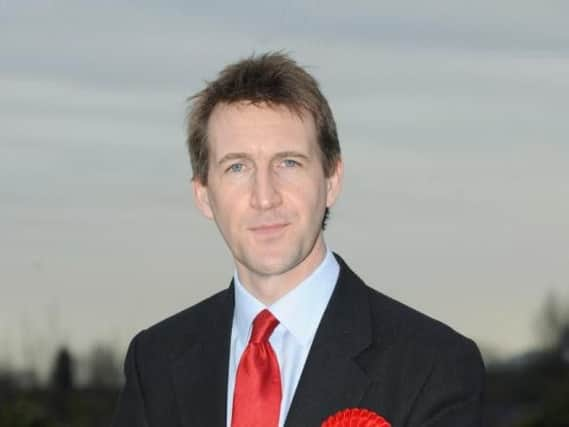Syria vote: MPs' raw emotion debating airstrikes


MPs were sat in the gangway in their suits, they were crouched down on steps, and squeezed onto the House of Commons’ green leather seats. The atmosphere was intense, restless, and at times angry and words were flung over the despatch box with verbal force.
The scene had all the hallmarks of a historic day in Parliament in the making, and more significantly a defining moment in David Cameron’s career.
Advertisement
Hide AdAdvertisement
Hide AdAfter all, he was stood on the very spot where Labour leader Tony Blair convinced MPs to back the highly controversial war in Iraq more than a decade ago.
Some MPs remember that moment all too well. MP David Winnick, now 82, has seen Margaret Thatcher, John Major and Tony Blair make the case for military action in different parts of the globe. But now it was David Cameron’s turn.
With the full attention of Parliament’s 650 MPs, he said there was no time to wait in defeating Daesh, the country’s biggest threat.
Airstrikes are needed, but not British troops on the ground, he argued.
Advertisement
Hide AdAdvertisement
Hide AdHe rose his voice and he spat out that Daesh were ‘medieval monsters’. He went red in the face when Labour leader Jeremy Corbyn said there were no ground forces that would back him that were not dubiously caught up in some form of jihadism.
Yet questions of war, peace, life and death, might and pacifism were heard most eloquently from those highly experienced voices on the back benches.
Some had spent days crafting their response that would be forever ‘on the record’. They had agonised over their choice of words, and as ex-British Army major and Barnsley Central MP Dan Jarvis said, the decision was in the end ‘finely balanced’ and he voted with the Government.
Like others in the room he has more than a decade of experience on the front-line of war zones including Sierra Leone, Kosovo, Iraq and Afghanistan.
Advertisement
Hide AdAdvertisement
Hide AdHe said: “The Labour Party, has a long and proud tradition of standing up for the national interest when our country is under threat. When the War Cabinet met in 1940, it was the Labour Ministers Clement Attlee and Arthur Greenwood who tipped the balance in favour of resisting Nazism. Daesh are the fascists of our time.”
He said there was no logic in opposing Daesh with airstrikes just in Iraq, when the border of their caliphate now extends into Syria.
“The action that is taking place in Iraq is working.
“There is no logic in opposing Daesh only in that country, as it does not recognise any border between its bases in Iraq and its stronghold in Syria. We must confront it over the same territory from which it is plotting attacks against us..”
Former soldier Johnny Mercer, was another MP who had the full attention of his colleagues and those in opposition.
Advertisement
Hide AdAdvertisement
Hide AdThe Conservative member for Plymouth, said: “I have seen the threats that we face with my own eyes and I have felt them with my own hands.”
Yvette Cooper (Normanton, Pontefract and Castleford), who was until very recently front and centre of the Labour party as shadow home secretary and ran against Mr Corbyn for the leadership, demonstrated her passion to help those suffering at the hands of Daesh.
Speaking from the heart after a recent trip to Lebanon and the Greek Island of Lesbos, where many Syrian refugees have fled, she said Britain cannot “leave it to other countries to take the strain”.
Ms Cooper said she backed strikes but “if it isn’t working in six months or if it proves counter productive we should be ready to review and we should also be ready to withdraw.” Daesh were branded a “death cult that glorifies suicide and slaughter” in her speech, and was just as straight-talking when she rounded on David Cameron for calling Jeremy Corbyn and those who voting against strikes ‘terrorist sympathisers’.
Advertisement
Hide AdAdvertisement
Hide AdShe added: “None of us, however we vote are terrorist sympathisers and none of us will have blood on our hands, the blood has been drawn by Isis, Daesh in Paris across the world and that is who we must stand against.”
The dignity in which Labour’s former foreign secretary Margaret Beckett spoke was the moment the debate turned from a spat between the war hungry and the die-hard anti-war camps, and into a measured discussion where those with experience shone.
Mrs Beckett, who was foreign secretary under Tony Blair between 2006 and 2007, is said to have influenced many last minute changes of heart. She said: ”I invite the House to consider how we would feel and what we would say if what took place in Paris had happened in London, if we had explicitly asked France for support, and France had refused.”
Hull West and Hessle Labour MP Alan Johnson, a former cabinet minister, said air strikes were just and proportionate.
Advertisement
Hide AdAdvertisement
Hide Ad“After recent events, where we sit now in this Parliament, having authorised military action by the RAF in Iraq, we can no longer justify not responding to that by extending our operations into Syria,” he said.
Conservative rebel David Davis said he was unconvinced that the strikes carried out so far in Iraq were working. Of all who spoke, he had the most impressive level of military detail on the number of strikes and their effectiveness.
Over in the House of Lords, former Conservative party leader and Richmond MP Lord Hague said: “As someone who led the Conservative Party at the time of the height of the power and success of Tony Blair, I am no stranger to perilous exercises.”
But on balance, military action was needed, he said.